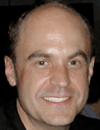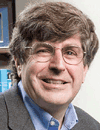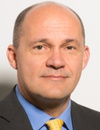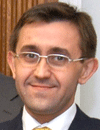Timothy Jamison
Robert R. Taylor Professor and Department Head, Massachusetts Institute of TechnologyTim Jamison was born in San Jose, CA and grew up in neighboring Los Gatos, CA. He received his undergraduate education at the University of California, Berkeley. A six-month research assistantship at ICI Americas in Richmond, CA under the mentorship of Dr. William G. Haag was his first experience in chemistry research. Upon returning to Berkeley, he joined the laboratory of Prof. Henry Rapoport and conducted undergraduate research in his group for nearly three years, the majority of which was under the tutelage of William D. Lubell (now at the University of Montreal). A Fulbright Scholarship supported ten months of research in Prof. Steven A. Benner’s laboratories at the ETH in Zürich, Switzerland, and thereafter he undertook his PhD studies at Harvard University with Prof. Stuart L. Schreiber. He then moved to the laboratory of Prof. Eric N. Jacobsen at Harvard University, where he was a Damon Runyon-Walter Winchell postdoctoral fellow. In July 1999, he began his independent career at MIT, where his research program focuses on the development of new methods of organic synthesis and their implementation in the total synthesis of natural products. |  | | | Klavs Jensen
Professor, Massachusetts Institute Of TechnologyKlavs F. Jensen is Warren K. Lewis Professor and Head of the Chemical Department at the Massachusetts Institute of Technology. His research interests revolve around novel techniques for continuous organic synthesis, flow chemistry. Catalysis, chemical kinetics and transport phenomena related to flow chemistry are also topics of interest along with development of simulation approaches for reactive chemical systems, specifically simulation across multiple length and time scales. He is the recipient of several awards and he is a member of the US National Academy of Engineering and the American Academy of Arts and Science.
|  | | | C. Oliver Kappe
Professor and Scientific Director, Center for Continuous Flow Synthesis and Processing, University of GrazC. Oliver Kappe is Professor of Chemistry at the University of Graz (Austria) and Scientific Director of the Center for Continuous Flow Synthesis and Processing (CC FLOW) at the Research Center Pharmaceutical Engineering GmbH (RCPE). He received his diploma (1989) and his doctoral (1992) degrees in organic chemistry from the University of Graz where he worked with Gert Kollenz on cycloaddition and rearrangement reactions of acylketenes. After periods of postdoctoral research work on reactive intermediates and matrix isolation spectroscopy with Curt Wentrup at the University of Queensland in Brisbane, Australia (1993-1994) and on synthetic methodology/alkaloid synthesis with Albert Padwa at Emory University in Atlanta, USA (1994-1996), he moved back to the University of Graz in 1996 to start his independent academic career. He obtained his „Habilitation“ in 1998 in organic chemistry and was appointed Associate Professor in 2000. Since 2011 he is Professor for „Technology of Organic Synthesis“ (Organische Synthesetechnologie) at the Institute of Chemistry at the University of Graz. He has spent time as visiting scientist/professor at e.g. the Scripps Research Institute (La Jolla, USA, K. Barry Sharpless, 2003), the Toyko Institute of Technology (Toyko, Japan, T. Takahashi, 2008), the Sanford-Burnham Institute for Medical Research (Orlando, USA, 2010) and the Federal University of Rio de Janeiro (Rio de Janeiro, Brazil, 2013-2015).
Professor Kappe has an extensive general experience and a 25 year track record in synthetic and physical organic chemistry, process intensification using batch microwave technology and flow chemistry/microreaction technology, communicated in ~400 scientific publications (Research ID, WoS h-Index 72). For the past decade the focus of his research has been directed towards flow chemistry/microreaction technology, encompassing a wide variety of synthetic transformations and experimental techniques. His research group is actively involved in projects dealing with API synthesis and manufacturing, employing a number of different enabling and process intensification technologies. For his innovative work in microwave chemistry he received the 2004 Prous Science Award from the European Federation for Medicinal Chemistry and the 2010 100.000 € Houska Prize in addition to a number of other awards. In 2015 he was named Fellow of the Royal Society of Chemistry.
C. Oliver Kappe is the Founding Editor and current Editor-in-Chief of the Journal of Flow Chemistry (Springer) and a board member of the Flow Chemistry Society. In addition he has been an Editor of the Journal QSAR and Combinatorial Sciences (Wiley-VCH, 2003-2007) and has served/serves on the Editorial/Advisory Boards of Green Chemistry, Reaction Chemistry & Engineering (RSC), Current Opinion in Green and Sustainable Chemistry (Elsevier), ChemMedChem and ChemSusChem (Wiley-VCH), Journal of Combinatorial Chemistry (ACS), Molecular Diversity (Springer), Journal of Heterocyclic Chemistry (Wiley-VCH) and a number of other journals. For several years he has been teaching courses on flow chemistry for Scientific Update. |  | | | Paul Watts
Distinguished Professor and Research Chair, Nelson Mandela UniversityProf Paul Watts started his career as a lecturer at the University of Hull in 2002, being promoted to full professor in 2011. At the University of Hull he led the micro reactor and flow technology group. In February 2013, he moved to Nelson Mandela University to hold the Distinguished Professorship and Research Chair in Microfluidic Bio/Chemical Processing. He has published of over 120 highly cited papers. He strongly believes that scientists should conduct research that impacts society; the biggest project underway involves the local production of key drugs as the morbidity and mortality from major diseases are much more devastating in Africa than in other regions of the world. The vision is that new technology will be used within South Africa to manufacture generic drugs; this could create jobs and a new manufacturing industry within the country. |  | | |
|

 Add to Calendar ▼2013-05-14 00:00:002013-05-15 00:00:00Europe/LondonFlow Chemistry CongressFlow Chemistry Congress in Boston, MA, USABoston, MA, USASELECTBIOenquiries@selectbiosciences.com
Add to Calendar ▼2013-05-14 00:00:002013-05-15 00:00:00Europe/LondonFlow Chemistry CongressFlow Chemistry Congress in Boston, MA, USABoston, MA, USASELECTBIOenquiries@selectbiosciences.com